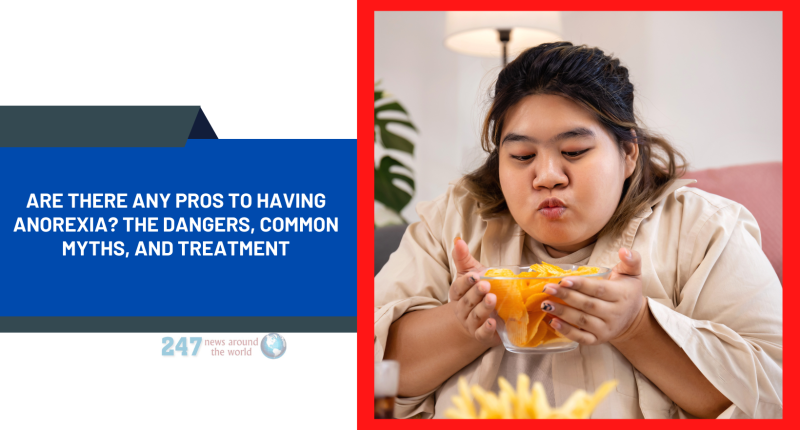Find out “Are There Any Pros to Having Anorexia?” Anorexia nervosa is a serious eating disorder that affects millions of people worldwide. It is characterized by a persistent restriction of food intake, leading to significantly low body weight, a strong fear of gaining weight, and a distorted perception of one’s body shape and size. Anorexia nervosa is not a choice or a lifestyle, but a mental illness that can have severe physical, emotional, and social consequences. Therefore, there are no pros to having anorexia, only devastating cons.
In this article, we will explore the dangers of anorexia nervosa and its impact on physical and mental health, relationships, and life quality. We will also address some common myths about anorexia and provide resources for recovery and support.
See Also | 10 Surprising Health Benefits Of Buns
Are There Any Pros to Having Anorexia?
Anorexia nervosa is a serious mental health disorder characterized by restrictive eating habits and an intense fear of gaining weight. Despite the life-threatening risks associated with the condition, there are still those who wonder if there are any potential benefits to having anorexia. In this article, we will explore this question in depth and provide a comprehensive answer.
First and foremost, it is crucial to understand that anorexia is a debilitating illness that can have severe consequences on a person’s physical, emotional, and mental well-being. The condition can lead to malnutrition, dehydration, organ failure, and even death. Furthermore, anorexia can have a profound impact on an individual’s relationships, social life, and overall quality of life. Given the severity of these consequences, it is difficult to imagine that there are any real benefits to having anorexia.

One common misconception is that anorexia can lead to weight loss, which some individuals may view as a positive outcome. While it is true that anorexia can cause a person to lose weight rapidly, this weight loss is not sustainable and can lead to significant health complications. Furthermore, the weight loss associated with anorexia is often accompanied by a host of other physical and psychological symptoms that can be debilitating.
Another possible “benefit” of anorexia is the sense of control that some individuals may feel when they restrict their food intake. For some people, the ability to control what they eat can be empowering and may provide a sense of accomplishment. However, this feeling of control is often short-lived and can quickly turn into a vicious cycle of anxiety, guilt, and shame.
It is also important to note that anorexia is not a choice, and it is not something that anyone should strive for. The condition is a serious mental illness that requires professional treatment, and anyone who is struggling with anorexia should seek help immediately. There are no real pros to having anorexia, and the risks far outweigh any perceived benefits.
See Also | Medicinal Uses of Betel Leaf | Health Benefits And Possible Side Effects
The Dangers of Anorexia Nervosa
Anorexia nervosa can have severe consequences on the body and mind. When the body is deprived of essential nutrients and energy, it tries to compensate by slowing down its metabolism and using its own tissues for energy. This can lead to:
- Malnutrition: Anorexia nervosa can cause severe malnutrition, which can affect all organs and systems of the body. Malnutrition can cause anemia, low blood pressure, slow heart rate, osteoporosis, hair loss, and dry skin, among other conditions.
- Gastrointestinal problems: Anorexia nervosa can cause digestive problems, such as constipation, bloating, and stomach pain, due to the lack of food and the body’s slow metabolism.
- Hormonal imbalances: Anorexia nervosa can cause hormonal imbalances that can affect reproductive, thyroid, and adrenal function. Hormonal imbalances can cause amenorrhea (absence of periods), infertility, low libido, and other complications.
- Cardiovascular problems: Anorexia nervosa can cause heart problems, such as arrhythmias, low blood pressure, and heart failure, due to the lack of energy and nutrients.
- Brain damage: Anorexia nervosa can cause brain damage, due to the lack of glucose and other essential nutrients. Brain damage can cause cognitive impairment, memory loss, and other neurological problems.
The Impact of Anorexia Nervosa on Mental Health and Relationships
Anorexia nervosa can also have severe consequences on mental health and relationships. Anorexia nervosa can cause:
- Depression and anxiety: Anorexia nervosa can cause depression and anxiety, due to the lack of energy, nutrients, and social isolation.
- Social isolation: Anorexia nervosa can cause social isolation, due to the fear of eating in public, the shame of having an eating disorder, and the obsession with body image.
- Relationship problems: Anorexia nervosa can cause relationship problems, due to the emotional instability, the lack of trust, and the need for control and perfectionism.
Common Myths about Anorexia Nervosa
There are many myths and misconceptions about anorexia nervosa that can hinder recovery and support. Some common myths about anorexia nervosa are:
- Anorexia nervosa is a choice or a lifestyle: Anorexia nervosa is not a choice or a lifestyle, but a mental illness that can have severe physical, emotional, and social consequences.
- Anorexia nervosa only affects young, white, middle-class women: Anorexia nervosa can affect people of all genders, ages, ethnicities, and socioeconomic backgrounds.
- Anorexia nervosa is only about food and weight: Anorexia nervosa is not only about food and weight, but also about control, perfectionism, and low self-esteem.
See Also | 18 Amazing Health Benefits of Papaya (Pawpaw)
Recovery and Support for Anorexia Nervosa: How to Overcome the Eating Disorder
Anorexia nervosa is a severe and potentially life-threatening eating disorder characterized by an intense fear of gaining weight, a distorted body image, and a significantly low body weight. It affects individuals of all ages, genders, and ethnicities, and can have devastating consequences if left untreated.
At our recovery and support center, we understand the challenges that come with anorexia nervosa and provide comprehensive treatment and care to help individuals overcome the eating disorder. We offer a range of services, including medical and nutritional support, therapy and counseling, and support groups to help individuals regain control over their lives and achieve lasting recovery.
Understanding Anorexia Nervosa
Anorexia nervosa is a complex and multifaceted eating disorder that affects millions of people worldwide. It typically develops during adolescence or young adulthood and is more common in women than men. Individuals with anorexia nervosa often have a distorted body image and an intense fear of gaining weight, even when they are underweight or malnourished.
The causes of anorexia nervosa are not entirely understood, but they are thought to involve a combination of genetic, environmental, and psychological factors. Risk factors for anorexia nervosa include a family history of eating disorders, perfectionism, low self-esteem, and stressful life events.
Signs and Symptoms of Anorexia Nervosa
Anorexia nervosa can have a significant impact on a person’s physical, emotional, and social well-being. Some common signs and symptoms of anorexia nervosa include:

- Significant weight loss
- Obsessive thoughts about food, weight, and body shape
- Refusal to eat certain foods or entire food groups
- Strict food rules and rituals
- Excessive exercise
- Social withdrawal and isolation
- Changes in mood and behavior
- Physical symptoms such as fatigue, dizziness, and fainting
If you or someone you know is experiencing these symptoms, it is essential to seek professional help. Our recovery and support center can provide the care and resources needed to overcome anorexia nervosa and achieve lasting recovery.
See Also | 11 Side Effects of Garden Egg Leaves On Humans: Uses And Benefits
Treatment and Support for Anorexia Nervosa
At our recovery and support center, we offer a range of evidence-based treatments and support services to help individuals overcome anorexia nervosa. Our team of experienced professionals includes medical doctors, psychiatrists, dietitians, therapists, and support staff who work together to provide comprehensive care tailored to each individual’s unique needs.
Our treatment approach emphasizes a multidisciplinary and collaborative approach to care, focusing on medical stabilization, nutritional rehabilitation, and psychotherapy. We offer individual therapy, group therapy, family therapy, and support groups to help individuals address the underlying emotional and psychological issues that contribute to anorexia nervosa.
In addition to traditional therapy, we also offer complementary and alternative therapies such as yoga, meditation, and art therapy to help individuals manage stress, improve body awareness, and promote overall well-being.
Our recovery and support center also provides ongoing support and resources to help individuals maintain their recovery and prevent relapse. We offer follow-up care, ongoing therapy, and support groups to help individuals stay on track and achieve lasting recovery.
Recovering from anorexia nervosa is a challenging and often lengthy process, but with the right treatment and support, it is possible to overcome the eating disorder and regain control over your life. If you or someone you know is struggling with anorexia nervosa, contact our recovery and support center today to learn more about our comprehensive treatment and support services.
Conclusion
In conclusion, anorexia is a devastating illness that can have serious consequences on a person’s health and well-being. While some individuals may view the condition as a way to achieve weight loss or gain a sense of control, the reality is that anorexia is a mental health disorder that requires professional treatment. Anyone who is struggling with anorexia should seek help immediately, and there are no real pros to having this condition.
See Also | 9 Amazing Health Benefits of Moringa Leaves and Ginger
Copyright © 2022 | 247newsaroundtheworld.com All rights reserved. The information contained in 247 News Around The World may not be published, broadcast, rewritten, or redistributed without the prior written authority of 247 News Around The World.
Last Updated on April 18, 2023 by 247 News Around The World







